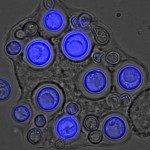Link to Pubmed [PMID] – 24182654
Rev Mal Respir 2013 Oct;30(8):682-95
Fungal infections are the most common opportunistic infections (OI) occurring during the course of HIV infection, though their incidence has decreased dramatically with the introduction of highly active antiretroviral therapy (cART). Most cases occur in untreated patients, noncompliant patients or patients whose multiple antiretroviral regimens have failed and they are a good marker of the severity of cellular immunodepression. Pneumocystis jiroveci pneumonia is the second most frequent OI in France and cryptococcosis remains a major problem in the Southern Hemisphere. With the increase in travel, imported endemic fungal infection can occur and may mimic other infections, notably tuberculosis. Fungal infections often have a pulmonary presentation but an exhaustive search for dissemination should be made in patients infected with HIV, at least those at an advanced stage of immune deficiency. Introduction of cART in combination with anti-fungal treatment depends on the risk of AIDS progression and on the risk of cumulative toxicity and the immune reconstitution inflammatory syndrome (IRIS) if introduced too early. Fungal infections in HIV infected patients remain a problem in the cART era. IRIS can complicate the management and requires an optimised treatment regime.

